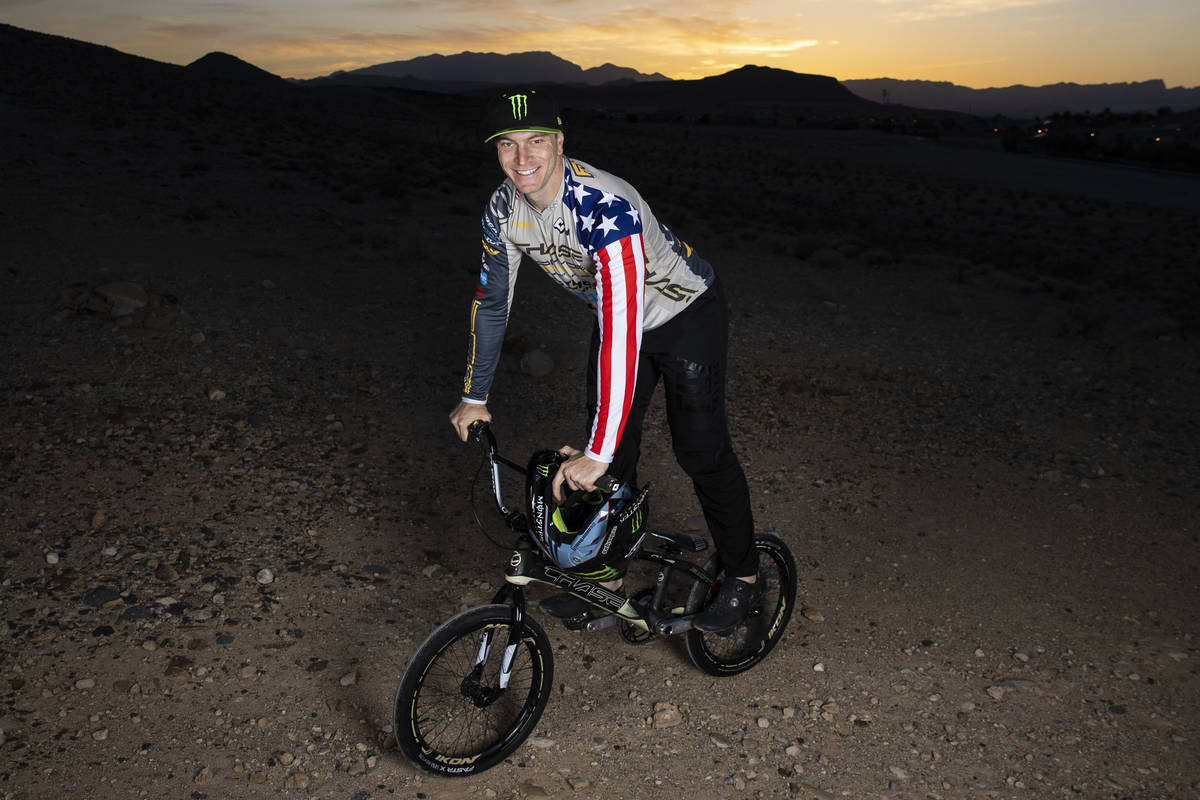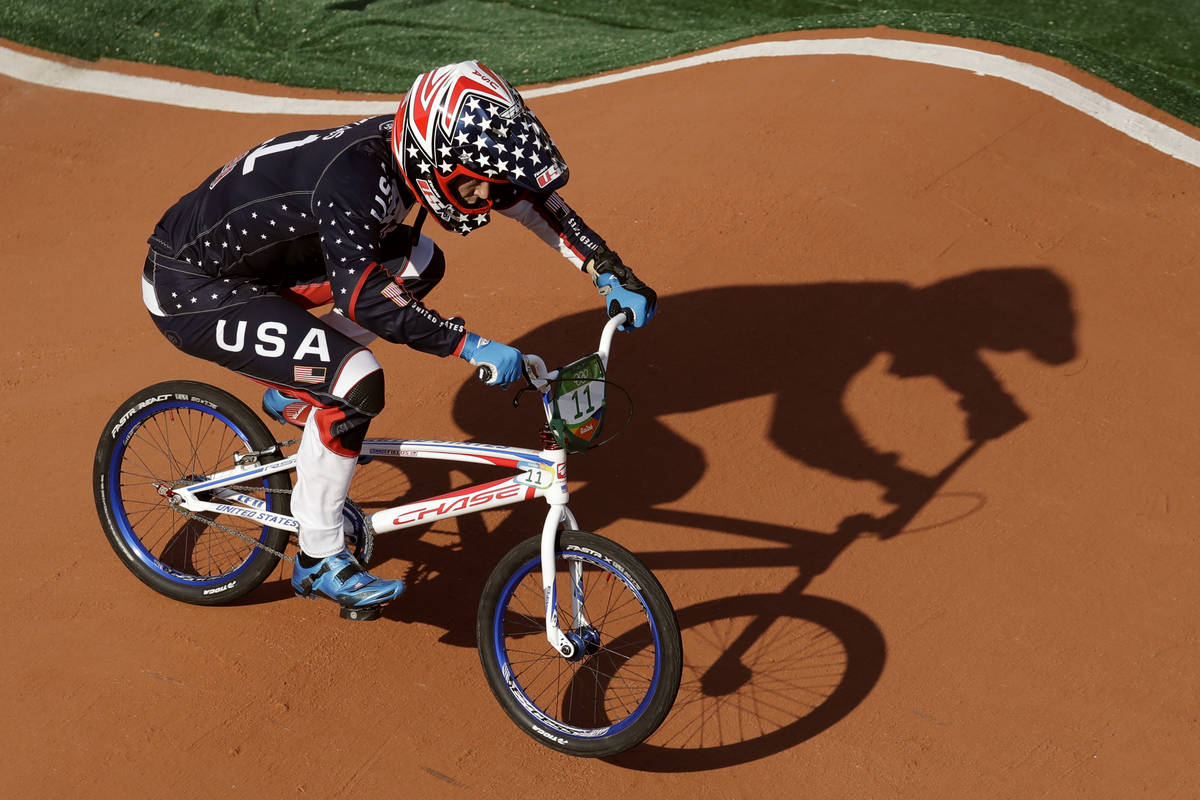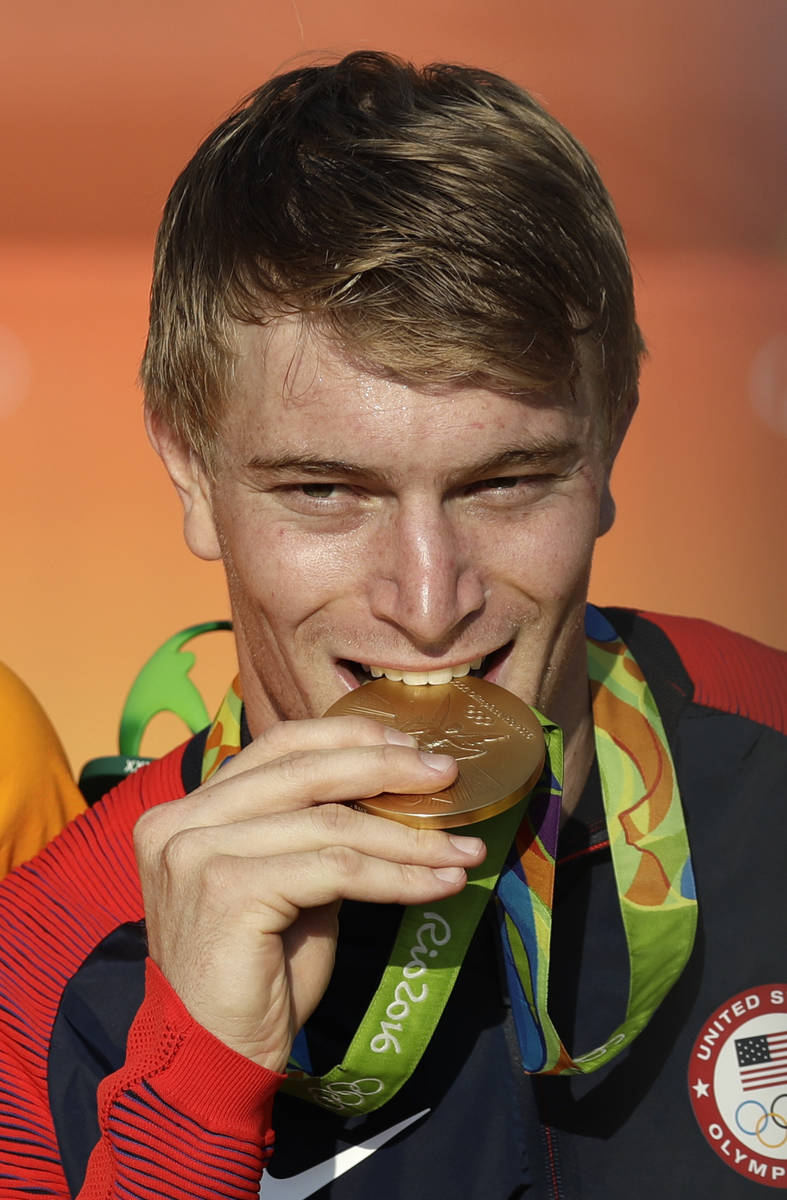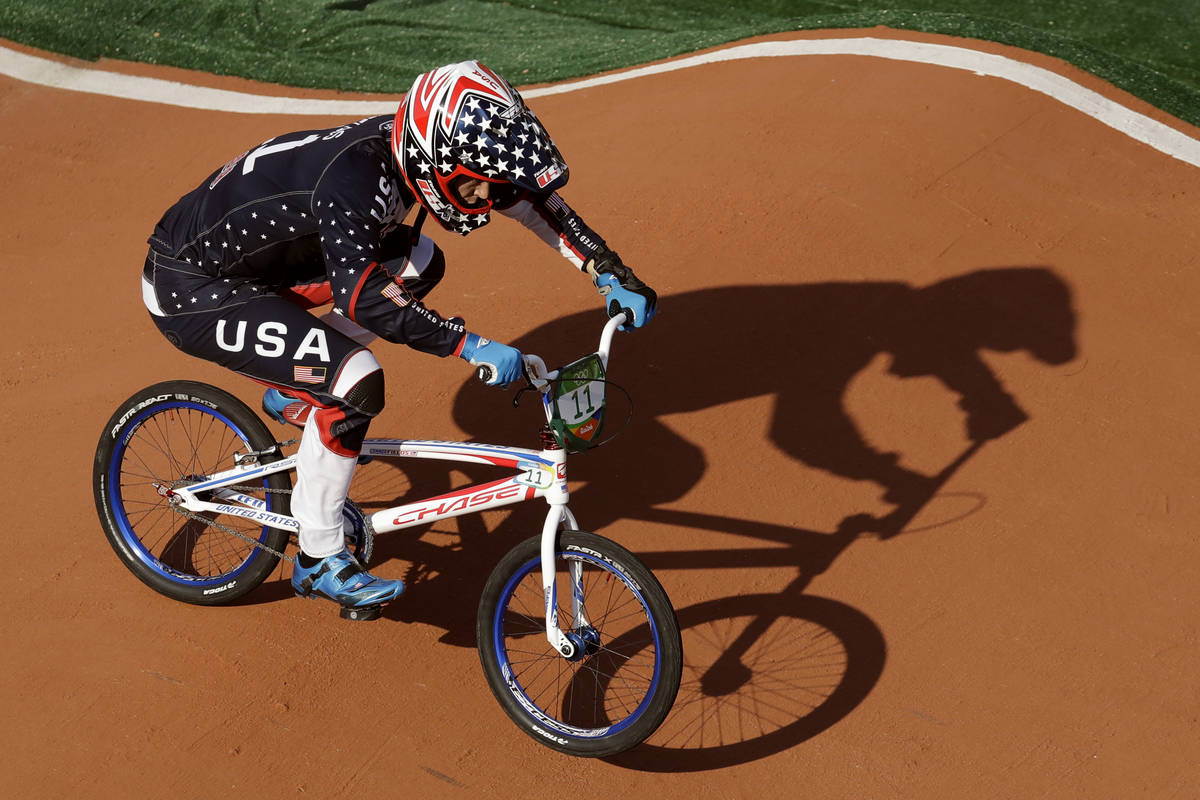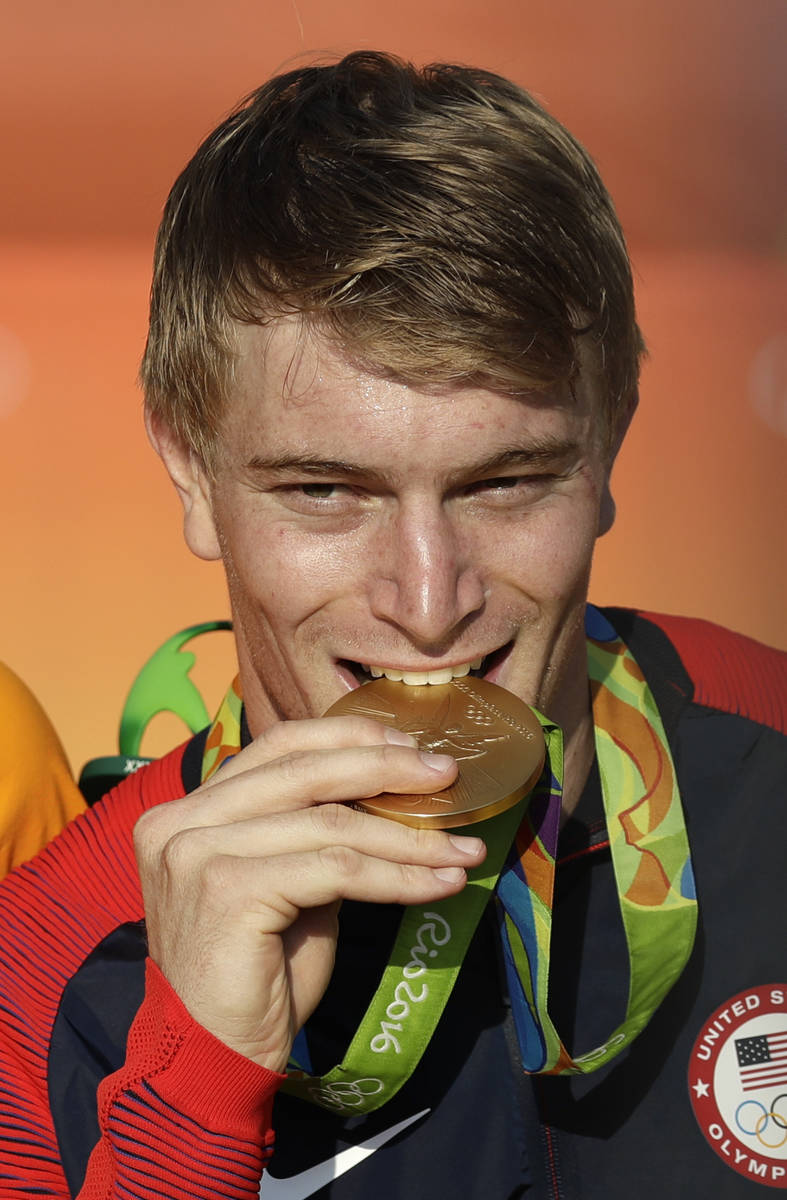Golden racer: Connor Fields chases second BMX medal in Tokyo
Connor Fields could read the room, knew what was coming, understood its significance. You don’t fly 100,000 miles annually for the last decade and religiously train six days a week year-round without gaining some level of perspective on things.
Like when time stopped in 2020.
“You’re not going to do all the work and come this far and walk away just because they added an extra 12 months,” Fields said of the Tokyo Olympics being delayed a year because of the pandemic. “There was no doubt I would keep going.
“I’ve always said that what makes great athletes great is their ability to adapt and overcome. I looked at this as a new challenge. It was the same for everybody. I just have to be as prepared as I can be.”
He’s 28 now. The Green Valley High and UNLV alumnus is heading to his third Olympics with an opportunity to defend a gold medal in BMX racing. He is older and wiser than when first launching forward from that starting gate atop a hill at the London Games in 2012.
But this part hasn’t changed for those who make the final: One race. Eight riders. Going 40 miles per hour while bunched together down the first straightaway. First to cross the finish line wins.
The faint of heart and lacking of knee cartilage need not apply.
As he attacks the 400-meter course at Ariake Urban Sports Park in Tokyo on July 29 and 30, perhaps the final time Fields will hunt an Olympics medal podium, each treacherous jump and turn will define the path that brought him to this place.
The ups and downs of it. The heartbreak and joy.
BMX athletes have described their sport as a horse race mixed with a roller-coaster ride. The key is to avoid those crashes and spills that end Olympic dreams. Fields has seen both sides.
“One was a lot more fun,” he said.
Seventh to gold
He has always embodied the Olympic spirit. Always been thoughtful and respectful of its meaning. Always remembered while competing on the world’s biggest athletic stage that 7-year-old boy whose mother first noticed a flier for BMX in a Henderson bike shop.
Before the thrill of victory in Rio five years ago, there was the slow start in London. Before gold shined brightly from his chest, there was the disappointment of being a top seed who finished seventh.
Fields was 19 when crashing on the first heat of a semifinal at the London Games, won the next two races to qualify first in the final and never got things going fast enough in dooming his chances for a medal.
He was 23 when falling to his knees in the exhaustion and exhilaration of Rio de Janeiro, having finished in 34.622 seconds and claiming the first gold medal in BMX for Team USA since the American-born action sport arrived to the Olympics in 2008.
“Connor is the clear standout when it comes to being professional, whether it’s his personality and character to his work ethic,” said Jamie Staff, a 2008 gold medalist in team track cycling for England and the high performance director for the Team USA BMX program. “That said, he’s human. It hasn’t always been easy.
“Winning a gold medal once is great. But winning it twice and having the motivation to put yourself through the torture of daily training is even better and takes an unbelievable amount of commitment.
”I’m sure Connor has hit a lull at some point, but he has been incredibly driven the past few months. He knows exactly what he wants and what he needs to do to get it.”
Training for Fields this last year has become more methodical. BMX traces its roots to the streets of California in the 1960s and 70s, of young riders trying to replicate on bikes what their motocross idols performed on off-road circuits.
Kids back then and now know just one speed. Lightning.
But time has taught Fields the importance of a sturdy mental game to balance that of his physical one. Used to be, he didn’t need much beyond natural talent to win. Used to be no longer exists.
“I have to warm up for a little bit longer and stuff gets sore for no reason,” Fields said. “You don’t really put a lot of thought into things when you’re younger doing this. You just go. Now, I have the benefit of experience across the board from which I can draw upon. When you’re younger, you’re experimenting and trying to figure things out.
“For me, I have found what works.”
Fear is not part of it.
In regard to racing or a pandemic.
Feeling safe
Tokyo recently entered a new state of emergency amid worries about a rise in COVID-19 cases. Opening ceremonies are July 23. Japan remains one of the world’s least protected countries, with only about 8 percent of its population having received at least one vaccine shot.
Olympic athletes will place medals around their own necks to protect against spreading the coronavirus, a significant change to traditional ceremonies in 339 events. There will be no handshakes allowed on the podium. No hugs. Medalists will wear masks.
“I’m not worried one bit,” Fields said. “I’m sure they’re going to put in as much effort as possible to make it safe for us. There is always risk. There were risks when I went to the grocery store five minutes ago.”
His parents watched in person in 2012 and 2016, decked in American colors, as proud as you can imagine a couple would be.
But spectators will be banned from nearly all Olympic venues in Tokyo, meaning friends and family of Fields will watch from home and be able to send video clips that will be shown adjacent to the BMX course. It might be the last time they see him in such a setting.
His is a high-risk sport. There’s no certainty Fields would embrace the idea of a fourth Olympics come 2024 in Paris. He would be 31 and racing against 20-year-olds who seem to fly higher and go faster with each passing year.
A week after returning from Tokyo, Fields will depart for Europe and the world championships. Eventually, he will slow the pedaling and think long-term picture.
Champion for life
“I’m closer to the end than the beginning,” he said. “I recognize this isn’t going to last forever. If January comes and I still want to go to boot camp and get up early and train six days a week and do double-days and be away from my family and friends for 15-20 weeks a year because I still want to race, I will.
“But if I wake up and don’t feel like squatting 400 pounds, I’ll go do something else.”
What we have always known about Fields: That while years of sacrifice ultimately led him to the pinnacle of his sport and could yet again in a few weeks, he has never been defined solely by a 38-second race.
If you’re good enough and have a flag and a dream, you receive an invitation to the Olympics and an opportunity to compete.
If this is it for him when it comes to the world of five interlocking rings, Fields will have done so with the passion and commitment of which Olympians are defined.
He’s a racer. A gold-medal champion for life.
Now, he gets a second chance at falling to his knees in the exhaustion and exhilaration of being the best.
Ed Graney is a Sigma Delta Chi Award winner for sports column writing and can be reached at egraney@reviewjournal.com or 702-383-4618. He can be heard on “The Press Box,” ESPN Radio 100.9 FM and 1100 AM, from 7 a.m. to 10 a.m. Monday through Friday. Follow @edgraney on Twitter.



